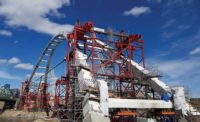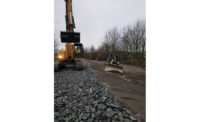Edmonton's long-delayed $155-million Walterdale Bridge, replacing a 103-year-old span over the North Saskatchewan River, is scheduled to open by the end of September after a two-year-plus delay that is expected to trigger millions of dollars in penalties for a joint venture formed by Spanish conglomerate Acciona and Canadian infrastructure builder Pacer Corp.
The opening of the 206-m-long span will come as a major relief to the Acciona-Pacer Joint Venture (APJV), which is being assessed $17,000 a day in penalties under its contract with the city, according to Kelly FitzGibbon, a spokeswoman for the city's infrastructure department.
By the time the bridge opens, the penalties may exceed $5 million, according to FitzGibbon.
"This delay is very disappointing, but the City's contract management processes have ensured that the City and taxpayers are protected in terms of cost implications," reads a statement on the city's website. "All costs for the delay are borne by the contractor."
Timetable Unravels for Edmonton Bridge
The project's timetable began unraveling in 2015, when the South Korean steel fabricator, Daewoo, failed to deliver components of the bridge's arches, deck and other key pieces, according to Canadian sources. Steel came trickling in months after it was originally slated to be delivered, with the final arch sections only delivered in October 2015—four months after the bridge was already supposed to be open.
In addition, Winnipeg-based Capitol Steel, the project's former steel erector, claims the late-arriving steel had serious defects. In an ongoing lawsuit filed in the Court of the Queen's Bench in Edmonton, Capitol Steel contends APJV required it to work with defectively fabricated steel and implement improper repair procedures.
In July 2015, APJV brought in another subcontractor, CentralSteel, to repair the steel structure. In its lawsuit, Capitol Steel contends that the repair work was subpar, including welds that did not meet "Canadian welding and bridge-construction codes" as well as "bolt-material test reports" that did not meet authorized standards.
Capitol's legal team is now gathering information for affidavits, according to Aaron London, the company's chief counsel.
APJV and the other companies involved in the project could not be reached for comment about the dispute. But in news accounts in Canadian media, APJV has blamed Capitol Steel for many of the problems.
Lawsuit Deals With Responsibility for Steel Flaws
FitzGibbon, the spokeswoman for Edmonton's infrastructure department, said the city could not comment on ongoing litigation.
In one account of APJV's lawsuit filings, the joint venture charged that, in reality, Capitol Steel is responsible for much of the project delay and that the subcontractor "repeatedly altered the repair procedures to increase cost and slow [Capitol Steel's] proper completion of the repair work," the CBC reported.
Damages of $10,000 a day for site occupancy began piling up, starting on June 12, 2015, the original date APJV set for the opening of the new Walterdale Bridge, according to FitzGibbon. An additional $7,000 a day for administrative costs—"consultants, city personnel, extra maintenance/traffic and other incidentals to support the project"—began accruing on Oct. 15, 2016.
However, Edmonton officials won't present APJV with the final bill until after the project is completed and "when any and all change orders have been submitted and considered," FitzGibbon wrote in an email.





Post a comment to this article
Report Abusive Comment